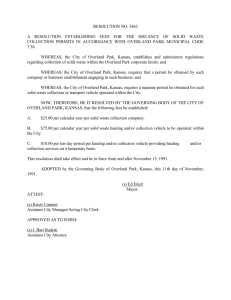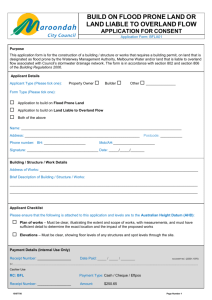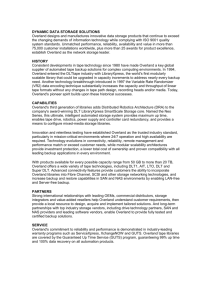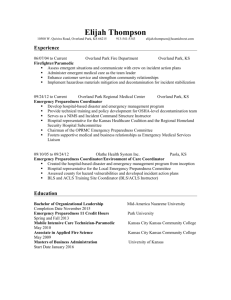Winter 2009 Newsletter - Archdiocese of Kansas City in Kansas
advertisement
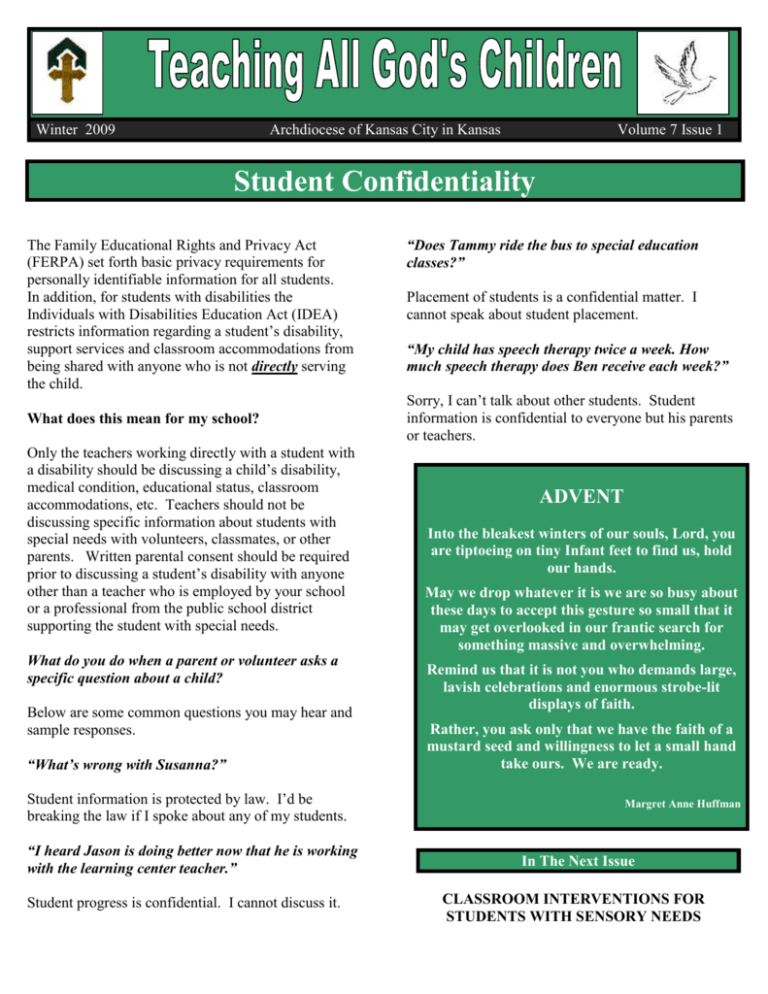
Winter 2009 Archdiocese of Kansas City in Kansas Volume 7 Issue 1 Student Confidentiality The Family Educational Rights and Privacy Act (FERPA) set forth basic privacy requirements for personally identifiable information for all students. In addition, for students with disabilities the Individuals with Disabilities Education Act (IDEA) restricts information regarding a student’s disability, support services and classroom accommodations from being shared with anyone who is not directly serving the child. What does this mean for my school? Only the teachers working directly with a student with a disability should be discussing a child’s disability, medical condition, educational status, classroom accommodations, etc. Teachers should not be discussing specific information about students with special needs with volunteers, classmates, or other parents. Written parental consent should be required prior to discussing a student’s disability with anyone other than a teacher who is employed by your school or a professional from the public school district supporting the student with special needs. What do you do when a parent or volunteer asks a specific question about a child? Below are some common questions you may hear and sample responses. “What’s wrong with Susanna?” Student information is protected by law. I’d be breaking the law if I spoke about any of my students. “I heard Jason is doing better now that he is working with the learning center teacher.” Student progress is confidential. I cannot discuss it. “Does Tammy ride the bus to special education classes?” Placement of students is a confidential matter. I cannot speak about student placement. “My child has speech therapy twice a week. How much speech therapy does Ben receive each week?” Sorry, I can’t talk about other students. Student information is confidential to everyone but his parents or teachers. ADVENT Into the bleakest winters of our souls, Lord, you are tiptoeing on tiny Infant feet to find us, hold our hands. May we drop whatever it is we are so busy about these days to accept this gesture so small that it may get overlooked in our frantic search for something massive and overwhelming. Remind us that it is not you who demands large, lavish celebrations and enormous strobe-lit displays of faith. Rather, you ask only that we have the faith of a mustard seed and willingness to let a small hand take ours. We are ready. Margret Anne Huffman In The Next Issue CLASSROOM INTERVENTIONS FOR STUDENTS WITH SENSORY NEEDS Additional Strategies to Protect Student Confidentiality Furthermore, in order to ensure student confidentiality, we should be aware of the following circumstances: School intercom announcements Call a student to the office rather than calling a child to let them know their bus is waiting. Confirm meetings with parents in writing or via a private phone call Put a note in the student’s backpack reminding the parent of an IEP meeting or progress meeting rather than saying, “I just wanted to remind you of Sam’s IEP meeting on Thursday” when passing the parent in the hallway, lunchroom or the parking lot. Use your schools Student Improvement Team to develop strategies and accommodations to support students with special needs Use the Student Improvement Team to share professional ideas and accommodations to support students rather than talking about students in less formal settings such as the teachers’ lounge, hallway, lunchroom or playground. Transition Reminder Maintain and document communication that may occur with public school special education professionals with whom you may be working (resource teachers, speech therapists, occupational therapists and physical therapists). Maintain (and document) communication with parents regarding student’s progress. Document any new accommodations and modifications and their effectiveness. Did You Know? Perfect Wings has a 15 minute video created by the Kansas State Department of Education on Confidentiality. Principals may check out this video by contacting Karen Kroh at 913-647-0319. Upcoming Training Opportunities *This is not to be considered an endorsement of these inservices, merely a listing of upcoming in-service opportunities. Creating Successful Interventions for AspergerTourette- High Functioning Autism –OCD – Bipolar- Pervasive Developmental Disorder Wednesday, January 27, 2010 Kauffman Center “Town Square” 4801 Rockhill Rd. Kansas City, MO For more information contact the Joshua Center for Neurological Disorders at 816-763-7605 Differentiated Reading with Make and Take February 19, 20 and 26, 2010 University of St. Mary, Overland Park Campus 11413 Pflumm Overland Park, KS For more information call 913-319-3009 Autism: Handling Meltdowns February 5 & 6, 2010 University of St. Mary, Overland Park Campus 11413 Pflumm Overland Park, KS For more information call 913-319-3009 Increasing Student Vocabulary March 12 & 13, 2010 University of St. Mary, Overland Park Campus 11413 Pflumm Overland Park, KS For more information call 913-319-3009 Multi-tiered Reading Support March 26 & 27, 2010 University of St. Mary, Overland Park Campus 11413 Pflumm Overland Park, KS For more information call 913-319-3009 Teaching Math to Use Math April 9 University of St. Mary, Overland Park Campus 11413 Pflumm Overland Park, KS For more information call 913-319-3009 & 10, 2010
